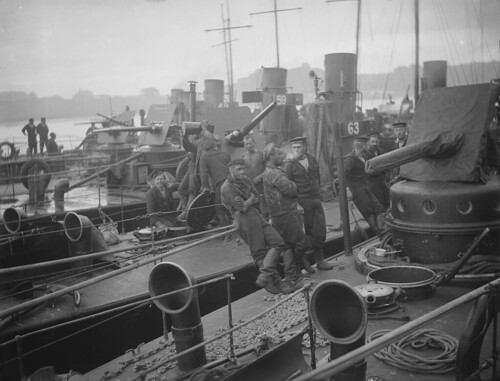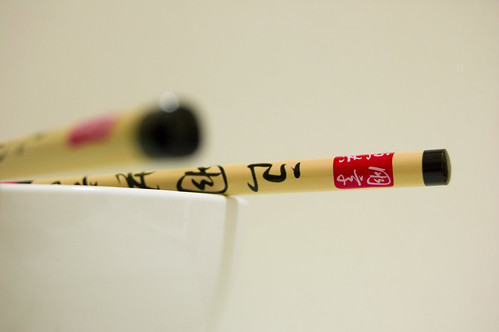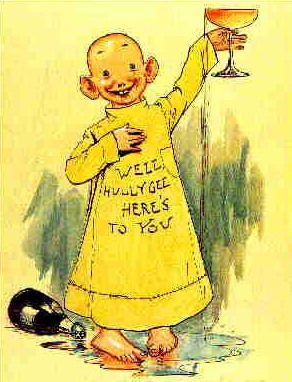We’re just days away from the series finale of the brilliant Breaking Bad. While we’ve been on the edges of our seats all season, we’ve also been listening for interesting terms. We’ve collected them right here, from euphemisms to legal terms to the changing meaning of a devil of a word.
Also be sure to check out our roundup of words that broke bad in the first half of the season.
A1
Walt [to Lydia]: “Give this to your car wash professional and have an A1 day.”
“Blood Money,” August 11, 2013
A1 is slang for first-class or outstanding. It originally referred to a wooden ship, says the Oxford English Dictionary (OED), “in respect of both hull and fittings.” Charles Dickens was one of the first to use A1 to mean anything excellent. From The Pickwick Papers: “‘He must be a first-rater,’ said Sam. ‘A1,’ replied Mr. Roker.”
In order to appear first in the phone book, a company may place multiple As and 1s before its name. But whether or not this actually improves business is questionable. A1 is also the brand name of a steak sauce.
change in management
Todd [to Walt]: “Me and Declan had some differences of opinion, and it got a little messy. It’s all straightened out now, but just a heads up that there’s been a kind of change in management.”
“Confessions,” August 25, 2013
Change in management is a euphemism for “a bunch of people quit or got fired and now there are new people in charge.” In this case, the former management was killed.
Todd’s dialogue is filled with euphemisms and biz speak, which are often one in the same: he and Declan had some “differences of opinion” rather than a murderous rivalry; the deadly shootout “got a little messy”; and Todd wants to make give Walt a “heads up” about the murder of Declan and his men.
dead to rights
Marie: “I got a call from Hank. He arrested Walt three hours ago. Dead to rights, I believe is the expression.”
“Ozymandias,” September 15, 2013
Dead to rights means “with sufficient evidence to establish responsibility definitively,” or as the OED puts it, caught “red-handed, in the act.” The phrase is also known as bang to rights. Dead to rights and bang to rights may come from the phrase deadbang meaning “open-and-shut; irrefutable.”
The phrase caught red-handed comes from the idea of a murderer being caught with blood on his hands.
Devil, the
Jesse [to Hank and Gomez]: “You two guys are just guys. Mr. White, he’s the Devil. He is smarter than you, he’s luckier than you. Whatever you think is supposed to happen, the exact reverse opposite of that is going to happen.”
“Rabid Dog,” September 1, 2013
The word devil comes from the Greek diabolos by way of Middle English, Old English, and Latin. In general use, diabolos means “accuser, slanderer,” according to the Online Etymology Dictionary.
The Devil was first known as “the proper appellation of the supreme spirit of evil” in Jewish and Christian theology, says the OED, and later was a “wicked or malevolent person.” The word gained the playful meaning of a “clever rogue” around 1600.
In “Blood Money,” the first episode of this last half of the season, Marie says jokingly to Walt, “You are the Devil!” A few episodes later Jesse refers to him as the Devil incarnate.
hat trick
Saul [to Jesse]: “The Feds have already taken Kaylee’s money twice. You’re going for a hat trick?”
“Blood Money,” August 11, 2013
A hat trick is three consecutive wins. The phrase comes from the game of cricket where it means “three wickets taken in cricket by a bowler in three consecutive balls.” It originated with the idea that such a bowler would be rewarded with a new hat.
rat patrol
Jack: “What are we talking? Rat patrol?”
Walt: “No, no. [Jesse’s] not a rat. He’s just angry.”
“To’hajiilee,” September 8, 2013
The rat in this case is “a despicable person, especially one who betrays or informs upon associates.” A rat patrol would exterminate such individuals.
The Rat Patrol was also an American TV show from the mid-1960s about four Allied soldiers “who are part of a long-range desert patrol group in the North African campaign during World War II.” Rat is the disparaging nickname given to “some of the British Commonwealth forces in the North African campaign.” Also called Desert Rats.
send someone on a trip to Belize
Walt: “Hank knows. That’s not nothing.”
Saul: “Yeah, I can’t exactly see him turning the other cheek. . . .Have you given any thought to sending him on a trip to Belize?”
“Buried,” August 18, 2013
To send someone on a trip to Belize is a euphemism for having someone killed. To sleep with the fishes, which comes from The Godfather, is another euphemism that means the individual is dead, most likely murdered and the corpse deposited in a body of water.
For more ways to say dead without saying dead, check out this list.
term of art
Saul: “It’s an actual store. I guess I figured ‘vacuum cleaner repair’ was a term of art.”
“Granite State,” September 22, 2013
A term of art is “a term whose use or meaning is specific to a particular field of endeavor.” These terms “have one or more specific meanings that are not necessarily the same as those in common use.”
“Vacuum cleaner repair” is the guise used by a man whose expertise lies in erasing people’s identities. Saul is surprised when the man appears to own an actual shop full of vacuums.
tweaker
Declan: “Heisenberg’s standards don’t matter anymore.”
Lydia: “To whom? A bunch of scabby Arizona tweakers?
“Buried,” August 18, 2013
A tweaker is someone addicted to methamphetamines, otherwise known as crystal meth. This meaning of tweaker has been around since the 1980s, says the OED, and comes from tweak meaning “to become agitated or excited” or “twitchy,” especially from drug use. Tweak could be a blend of freak out and twitch.
[Photo: via Celebuzz]








